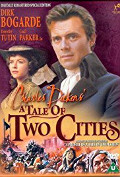
Directed by
Ralph Thomas
117 minutes
Rated PG
Reviewed by
Bernard Hemingway

Tale Of Two Cities, A
Although it is not as persuasive as David Lean’s Great Expectations (1946) and Oliver Twist (1948), Ralph Thomas’s adaptation of 'A Tale of Two Cities' is an enjoyable film that stays faithful to Charles Dickens’ historical adventure story with its tableau of characters and orotund dialogue.
Dirk Bogarde plays Dicken’s romantically-doomed hero, Sydney Carton, a lush who at the time of the French Revolution redeems himself for his mis-spent life by going to the guillotine in place of a former French aristocrat, Charles Darnay (Paul Guers), who is the husband of the woman. Lucie Manette (Dorothy Tutin) whom Carton loves. Cecil Parker, as a fastidious banker and Alfie Bass as his somewhat incongruous factotum, Athene Seyler as Lucie’s old nurse, Donald Pleasance as a low informer and Rosalie Crutchley, as a bloodthirsty communarde, round out the main cast.
A Tale of Two Cities is a well-mounted production which goes to a good deal of trouble to block in the historical context for the revolution, the causes of which are epitomized by Christopher Lee’s sadistic Marquis St. Evremonde. The main focus., however, is on Carton and his tortured psyche. Frustratingly T.E.B. Clarke’s screenplay gives no explanation for Carton’s existential alienation (which I take to mean that neither did Dickens) and so we have to take it as a given. Bogarde who was still a matinee idol at the time brings little more than good looks to the role but a general tone of ennui and his regular repertoire of gestures ranging from the cocked left eyebrow of circumspection to languishing in poses of despair, his hand on his brow, and saying things such as “ I care for no man, and no man cares from me” (which he says to his reflection). It’s not great acting but Bogarde fans will enjoy it,
Thomas stages some striking scenes such as the trial of Darnay before the Revolutionary Tribunal and Carton being taken by tumbrel through the howling crowd to his death. The storming of the Bastille and the riots in the Paris streets are less effectively done. In sum, however, Thomas’s film does justice to Dickens’ saga of noble redemption, memorably captured by Carton's famous words uttered before the guillotine “It is a far, far better thing that I do, than I have ever done; it is a far, far better rest that I go to than I have ever known”...
Want something different?





